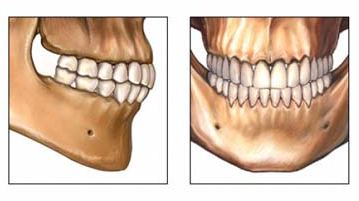Bruxism – Bruxism
Description of bruxism
Bruxism – chronic, involuntary grinding or clenching of teeth. It usually occurs during sleep, but may also occur while awake.

Causes of bruxism
Exact cause of bruxism is unknown, but, believed, may cause:
- Stress and alarm;
- Anomalies of the teeth or jaws.
Risk factors for bruxism
Risk factors include:
- Chronic stress or anxiety;
- Aggressiveness;
- Abuse of drugs or alcohol (especially methamphetamines reception);
- Post traumatic stress disorder;
- Age: 40 or younger; especially common in women aged 27-40 years;
- I have a family member with bruxism;
- Facial or oral trauma;
- Use of psychotropic drugs, especially antidepressants, such as Zoloft, Paxil and Prozac;
- Prior serious head injury.
Symptoms of bruxism
Symptoms may include:
- Grinding sound while sleeping;
- Teeth sensitive to heat, cold, or brushing;
- Tense the muscles of the face and jaw;
- Cracked enamel on some teeth;
- Pain in the teeth;
- Gingivitis (gingivitis);
- Headache, especially in the morning after waking up;
- Damage to the inside of the cheek (from biting or chewing);
- The disorder of the temporomandibular joint.
Diagnosis of bruxism
The doctor or dentist will ask about your symptoms and medical history and examine your teeth and jaw. In the presence of bruxism teeth enamel may be thin or have a damaging.
Treatment of bruxism
Methods of treatment include:
Povedencheskaya and kognitivnaya therapy
This method focuses on changing behavior through various methods, such as:
- Biofeedback;
- Stress Management;
- Relaxation exercises and relaxation.
Orthodontic treatment
Your dentist may recommend mouth guards, which prevent damage to teeth.
Medication
Medication is only recommended for short-term use, and may include:
- Muscle relaxants;
- Lightweight sleeping;
- Injection botuliničeskogo toxins (Botox) in severe cases;
- New products, such as clonidine, currently being studied as an alternative method of treatment.
Bruxism, if left untreated, It can damage the gums, loss of natural teeth, diseases of jaws.
Prevention of bruxism
Methods, used to treat bruxism, They may be used to prevent the disease.
